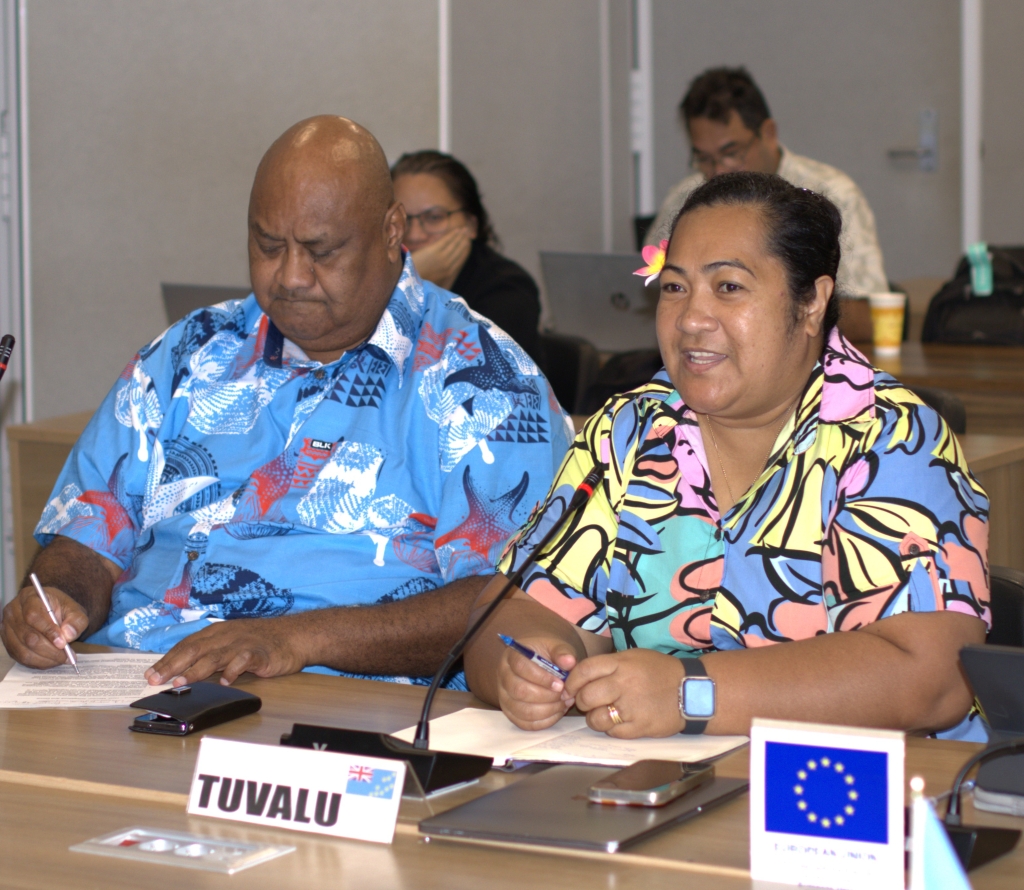
2 August 2024, Funafuti Tuvalu - A project designed to ensure the safe and sustainable management of waste with due regard for the conservation of biodiversity, health and wellbeing of Pacific island communities is making a tangible difference in 15 Pacific countries where it is being implemented, contributing to a Cleaner Pacific.
The Pacific-EU Waste Management Programme (PacWastePlus), funded by the European Union and implemented by the Secretariat of the Pacific Regional Environment Programme (SPREP), which is now in its final year of implementation, is also contributing to stronger regional economic integration and the sustainable management of natural resources in the Pacific, through seven regional projects it is rolling out.
The achievements of PacWastePlus were highlighted during its 5th Steering Committee Meeting at the Rt Hon. Dr Sir Tomasi Puapua Convention Centre, Funafuti, Tuvalu on Friday 2 August 2024. The meeting precedes the 4th Clean Pacific Roundtable (4th CPRT) scheduled at the same venue from 5- 9 August 2024.
“Since the project came into Tuvalu, we’ve seen tremendous improvement in effective management of waste here on Funafuti, as well as our outer islands,” said Ms Pepetua Latasi, Permanent Secretary, Ministry for Home Affairs, Climate Change and Environment.
“For Tuvalu in particular, we import nearly 80 percent of goods from construction materials, medical supplies, food and everything else. As a result, you can see from there the amount of waste generated from this importation which we require assistance to address. We are very thankful and appreciate the support that has been provided through the project over the recent past trying to manage the different wastes generated on a daily basis in Tuvalu.”

The sentiments were echoed by Mr Haden Talagi, Niue’s Director of Environment.
“I am happy to say that PacWastePlus is making a significant difference through current activities, initiatives in motion and already implemented on the ground to improve the management of waste in our country,” said Mr Talagi.
“I like the action-oriented nature of the project which is the main thing a lot of Niueans want to see, touch and feel. People don’t want to see another report but they want to see action on the ground and that is what PacWastePlus brings to the table in terms of helping us deal with different types of waste.”
In all Pacific countries working with the project, baseline waste audit reports have been developed. Pilots of behaviour change projects are already in motion in Papua New Guinea (PNG), Vanuatu and the Solomon Islands.
The Kingdom of Tonga has already endorsed its Asbestos implementation Ban and Asbestos Management Code of Practice. Other Pacific countries are working towards theirs.
Vanuatu is amongst nine countries working to improve or introduce Product Stewardship legislations, to ensure that whoever designs, produces, sells, or uses a product takes responsibility for minimising the product's environmental impact throughout all stages of the products' life cycle, including end of life management.
Timor-Leste is amongst six countries where PWP is working to repair or install healthcare waste incinerators. It is also working to develop National Strategies for healthcare waste, asbestos management, and e-waste and is promoting the implementation of organic waste programmes, like it is rolling out in Tuvalu.
SPREP’s Director General, Mr Sefanaia Nawadra, said this is just some of the work PWP is undertaking and he acknowledged the European Union for allowing the extensions and modifications to the project to adjust for the hardships caused by COVID.
“The European Union’s continued support of the region, and for SPREP as an implementing agency is greatly valued for SPREP and our members. PacWastePlus along with the under completion PACRES and ACP MEA project follow EU geographic designations for ACP and include Timor-Leste, having the largest geographical coverage and until the recent signing of the GEF ISLANDS project and Weather Ready Pacific Initiative, was the largest financial programme,” said Mr Nawadra.
“We should celebrate the successes of your efforts, but we cannot slow down or become complacent – there is still much work to be done in the remaining twelve months of the project. I look forward to hearing you all share your actions today, and more importantly I look forward to hearing the confirmation of the remaining tasks, and your commitment to their delivery.”
Head of Cooperation, Delegation of the European Union for the Pacific, Mr Maurizio Cian, said all these accomplishments would not have been possible without hard work of SPREP and the cooperation of the countries.
“The European Union has been supporting sustainable waste management in the Pacific for the past ten years. It is our common goal that our investments create a lasting impact and improve the quality of life for communities across the Pacific,” said Mr Cian.
“I would also like to thank SPREP’s Programme Management Unit for your dedication through the past years of implementation and for organising this event for us today. I would also like to thank Tuvalu for hosting us and to all the country delegates and project partners being part of this journey. Despite the progress, I see that there is still a lot of work ahead of us as we look into the last year of the programme implementation.”
ABOUT PACWASTEPLUS
The Pacific-EU Waste Management Programme (PacWastePlus) is a 72-month project funded by the European Union and implemented by Secretariat of the Pacific Regional Environment Programme (SPREP) and will address both the cost effective and sustainable management of waste and pollution as well as broader impacts including human health and wellbeing, climate change, disaster management, biodiversity conservation and resource recovery. Priority waste streams include hazardous wastes (specifically asbestos, E-waste and healthcare waste), solid wastes (specifically recyclables, organic waste, disaster waste and bulky waste) and related aspects of wastewater.